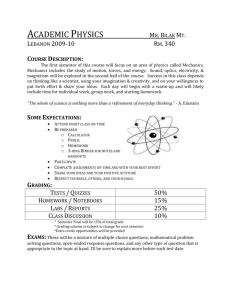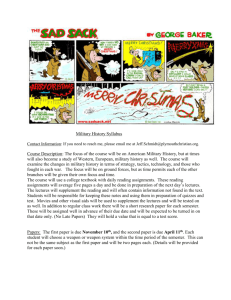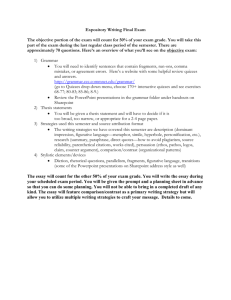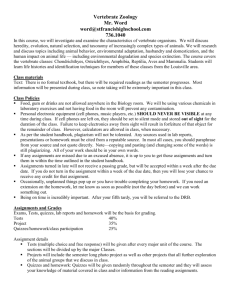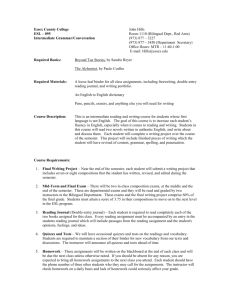syllabus Epic2010
advertisement
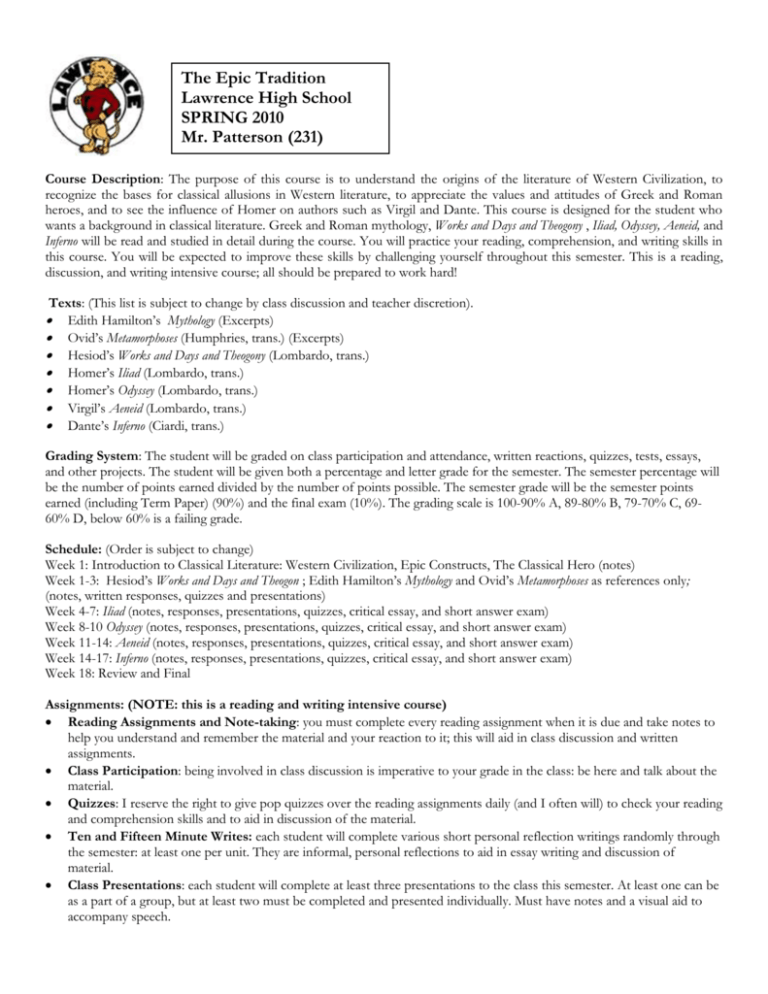
The Epic Tradition Lawrence High School SPRING 2010 Mr. Patterson (231) Room 231 Course Description: The purpose of this course is to understand the origins of the literature of Western Civilization, to Prerequisite: English and oneliterature, other recognize the bases for classical allusions in 10 Western to appreciate the values and attitudes of Greek and Roman Sophomore English Course. heroes, and to see the influence of Homer on authors such as Virgil and Dante. This course is designed for the student who wants a background in classical literature. Greek and Roman mythology, Works and Days and Theogony , Iliad, Odyssey, Aeneid, and Course Description: Inferno will be read and studied in detail during the course. You will practice your reading, comprehension, and writing skills in this course. You will be expected to improve these skills by challenging yourself throughout this semester. This is a reading, discussion, and writing intensive course; all should be prepared to work hard! Texts: (This list is subject to change by class discussion and teacher discretion). Edith Hamilton’s Mythology (Excerpts) Ovid’s Metamorphoses (Humphries, trans.) (Excerpts) Hesiod’s Works and Days and Theogony (Lombardo, trans.) Homer’s Iliad (Lombardo, trans.) Homer’s Odyssey (Lombardo, trans.) Virgil’s Aeneid (Lombardo, trans.) Dante’s Inferno (Ciardi, trans.) Grading System: The student will be graded on class participation and attendance, written reactions, quizzes, tests, essays, and other projects. The student will be given both a percentage and letter grade for the semester. The semester percentage will be the number of points earned divided by the number of points possible. The semester grade will be the semester points earned (including Term Paper) (90%) and the final exam (10%). The grading scale is 100-90% A, 89-80% B, 79-70% C, 6960% D, below 60% is a failing grade. Schedule: (Order is subject to change) Week 1: Introduction to Classical Literature: Western Civilization, Epic Constructs, The Classical Hero (notes) Week 1-3: Hesiod’s Works and Days and Theogon ; Edith Hamilton’s Mythology and Ovid’s Metamorphoses as references only; (notes, written responses, quizzes and presentations) Week 4-7: Iliad (notes, responses, presentations, quizzes, critical essay, and short answer exam) Week 8-10 Odyssey (notes, responses, presentations, quizzes, critical essay, and short answer exam) Week 11-14: Aeneid (notes, responses, presentations, quizzes, critical essay, and short answer exam) Week 14-17: Inferno (notes, responses, presentations, quizzes, critical essay, and short answer exam) Week 18: Review and Final Assignments: (NOTE: this is a reading and writing intensive course) Reading Assignments and Note-taking: you must complete every reading assignment when it is due and take notes to help you understand and remember the material and your reaction to it; this will aid in class discussion and written assignments. Class Participation: being involved in class discussion is imperative to your grade in the class: be here and talk about the material. Quizzes: I reserve the right to give pop quizzes over the reading assignments daily (and I often will) to check your reading and comprehension skills and to aid in discussion of the material. Ten and Fifteen Minute Writes: each student will complete various short personal reflection writings randomly through the semester: at least one per unit. They are informal, personal reflections to aid in essay writing and discussion of material. Class Presentations: each student will complete at least three presentations to the class this semester. At least one can be as a part of a group, but at least two must be completed and presented individually. Must have notes and a visual aid to accompany speech. Essays: each student will write at least two MLA style essays this semester. They will be evaluated using the Six Trait Method. These essays will be composed using comparison/contrast, critical analysis and personal response essay styles. Creative Writing: Each student will have the opportunity throughout the semester to write original, creative responses to the units we study. Optional: write-your-own–classical myth assignments will be offered. Exams: All exams in this course are written: short essay and short answer and must be well-organized and wellcomposed. Term Paper: each student will complete a research-based term paper over the course of the semester. It will be at least 1,000 words (four pages) and will be composed in MLA style. MORE INFORMATION TO COME, soon. ALL ASSIGNMENTS MUST BE COMPLETED TO RECEIVE A PASSING GRADE IN THIS COURSE! Class Rules: All LHS rules apply in and out of classroom. See student handbook for LHS rules. All rules and policies are subject to the teacher’s discretion. Infractions will result in disciplinary action. Continual problems may result in removal from the class. Mr. P’s Rules: 1. RESPECT and Community. Have respect for one another, the material, and yourself at all times. This can be a very open and friendly classroom but that those feelings will be destroyed if basic respect and compassion not practiced. Each student should think of themselves as a member of a community within this school but also within this class. If we regard ourselves and each other in this way we will be able to foster the qualities that will make this classroom open and honest where all students feel comfortable enough to speak their minds, develop original opinions and express themselves individually. 2. Preparation/Tardiness. Always be prepared for class. This means not only having your work completed before class but being in class every day, on time and in your seat ready to work when the bell rings. You will be given one warning and then time will be owed after school as determined by school rules. If you come to class late, sign up on the tardy list. DO NOT interrupt class with an explanation, simply stay after class for a minute and work out a solution with me. 3. Absences. If you miss a class, it is your responsibility to get the notes, handouts and assignments from another student. See me before or after school or before or after class to ask questions or make up quizzes or exams. Communication is essential and it is up to you to take the initiative. 4. Late Work. Late work will not be accepted without a written request/explanation. Late work with written request will be accepted no later than a week of due date. Exams should be made up within one week of test date. I am flexible but you must work to take advantage of that. Students who take the initiative will be aptly rewarded. 5. Food and Drink. Don't try to sneak it, ask! Always clean up after yourself! Water is always acceptable as long as it is in a container with a lid. 6. NO CELL PHONES IN CLASS! Supplies: You will need a composition book and a binder with pockets and loose-leaf paper to use only for this class. You will need this daily along with a writing utensil. I see this course as an advanced course; a course in the classics for those dedicated to the study of literature—in this case—at its Western origins. This has the potential to be a very interesting class. The material can be difficult, but it is often intriguing (though that is always relative to student participation and attitude). It is also rigorous and requires quite a bit of effort as well as a fairly large time commitment. You will be doing a lot of reading and a lot of writing. I will do my best to be enthusiastic and to make the material pertinent and the assignments relevant. I hope that each of you will make a commitment to open your minds and engage in active learning during our time together. Your goal should be to trace the origins of Western culture and literature and see its influence on the modern world through the words and myths of the Ancients. You will, in the process, learn quite a lot about your own abilities to read well and write insightfully. Welcome and Good Luck, Mr. Patterson

